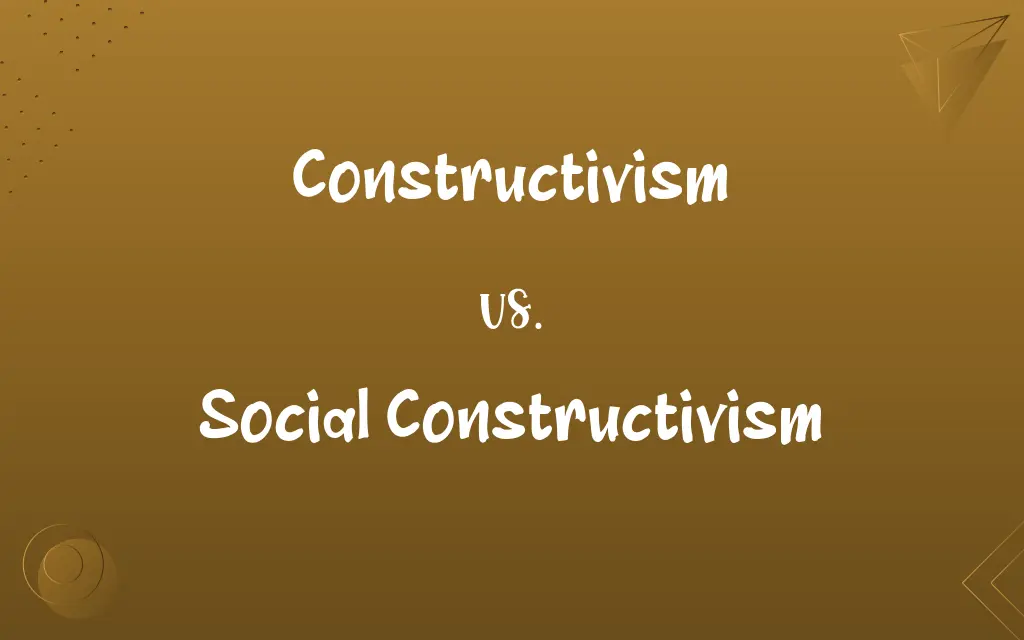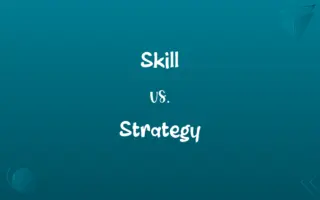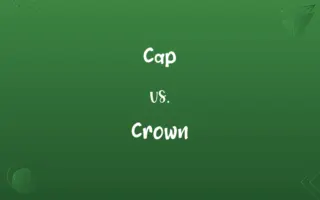Constructivism vs. Social Constructivism: Know the Difference

By Shumaila Saeed || Published on January 3, 2024
Constructivism focuses on individual learning through experience, while Social Constructivism emphasizes learning as a social process.

Key Differences
Constructivism is a learning theory positing that individuals construct their own understanding and knowledge of the world through experiences and reflecting on those experiences. Social Constructivism, on the other hand, argues that the social context and interactions play a fundamental role in the process of constructing knowledge.
Shumaila Saeed
Jan 03, 2024
Constructivism suggests that learning is an active, constructive process where learners actively construct their own understanding. Social Constructivism extends this idea to include the influence of cultural and social contexts in shaping the learning process.
Shumaila Saeed
Jan 03, 2024
Constructivism emphasizes the importance of the learner being actively involved in their own learning process. In contrast, Social Constructivism highlights the role of interaction with others and cultural norms in developing understanding.
Shumaila Saeed
Jan 03, 2024
Constructivism is centered on the concept that cognitive processes are essential to the individual learning journey. Conversely, Social Constructivism focuses more on the ways in which individuals co-construct knowledge through social interactions.
Shumaila Saeed
Jan 03, 2024
Constructivism involves learners using their past experiences to understand new information, whereas Social Constructivism involves learners co-constructing new knowledge through shared experiences and social discourse.
Shumaila Saeed
Jan 03, 2024
ADVERTISEMENT
Comparison Chart
Learning Process
Individual experiences and reflection
Social interaction and cultural context
Shumaila Saeed
Jan 03, 2024
Role of the Learner
Active constructor of knowledge
Participant in social and collaborative learning
Shumaila Saeed
Jan 03, 2024
Emphasis
Individual cognitive processes
Social interaction and cultural norms
Shumaila Saeed
Jan 03, 2024
Knowledge Development
Through personal experiences and internalization
Through social discourse and co-construction
Shumaila Saeed
Jan 03, 2024
Contextual Influence
Primarily internal cognitive context
External social and cultural contexts
Shumaila Saeed
Jan 03, 2024
ADVERTISEMENT
Constructivism and Social Constructivism Definitions
Constructivism
Constructivism is the theory that knowledge is constructed by the learner based on personal experiences.
In a constructivist classroom, students might learn about gravity by dropping various objects and observing.
Shumaila Saeed
Dec 28, 2023
Social Constructivism
Social Constructivism posits that knowledge is constructed through social interactions and cultural contexts.
In social constructivism, a history lesson might involve students discussing different perspectives of an event.
Shumaila Saeed
Dec 28, 2023
Constructivism
Constructivism asserts that problem-solving and critical thinking are central to the learning process.
In constructivism, a student may learn science by conducting experiments and forming hypotheses.
Shumaila Saeed
Dec 28, 2023
Social Constructivism
Social Constructivism highlights the role of language and communication in the learning process.
Students learning a language through social constructivism might engage in conversations with native speakers.
Shumaila Saeed
Dec 28, 2023
Constructivism
Constructivism emphasizes that learning is an active, contextualized process of constructing knowledge rather than acquiring it.
Through constructivist teaching, students learn history by analyzing primary sources, not just memorizing dates.
Shumaila Saeed
Dec 28, 2023
ADVERTISEMENT
Social Constructivism
Social Constructivism stresses the importance of social interaction and community in constructing knowledge.
In social constructivism, a science project might involve students collaboratively researching and presenting findings.
Shumaila Saeed
Dec 28, 2023
Constructivism
Constructivism posits that learning is a process of building upon what one already understands.
A student learning algebra in a constructivist approach might relate it to their prior knowledge of arithmetic.
Shumaila Saeed
Dec 28, 2023
Social Constructivism
Social Constructivism emphasizes that learning occurs as individuals engage and collaborate with others.
A classroom using social constructivism might have students working in groups to solve complex problems.
Shumaila Saeed
Dec 28, 2023
Constructivism
A movement in modern art originating in Moscow in 1920 and characterized by the use of industrial materials such as glass, sheet metal, and plastic to create nonrepresentational, often geometric objects.
Shumaila Saeed
Dec 27, 2023
Social Constructivism
Social Constructivism suggests that understanding is shaped by social narratives and cultural heritage.
Social constructivism in literature class involves students discussing how cultural context influences a novel.
Shumaila Saeed
Dec 28, 2023
Constructivism
(arts) A Russian movement in modern art characterized by the creation of nonrepresentational geometric objects using industrial materials.
Shumaila Saeed
Dec 27, 2023
Constructivism
(mathematics) A philosophy that asserts the need to construct a mathematical object to prove it exists.
Shumaila Saeed
Dec 27, 2023
Constructivism
A psychological epistemology which argues that humans generate knowledge and meaning from their experiences.
Shumaila Saeed
Dec 27, 2023
Constructivism
An abstractionist artistic movement in Russia after World War I; industrial materials were used to construct nonrepresentational objects
Shumaila Saeed
Dec 27, 2023
Constructivism
Constructivism holds that learners have unique perspectives and interpretations of the world.
In a constructivist art class, each student's unique painting style is seen as a reflection of their personal worldview.
Shumaila Saeed
Dec 28, 2023
Repeatedly Asked Queries
What role do teachers play in a Constructivist classroom?
In Constructivism, teachers guide and facilitate learning, encouraging students to explore and reflect on their experiences.
Shumaila Saeed
Jan 03, 2024
How does Constructivism differ from traditional learning theories?
Constructivism differs by focusing on learners actively constructing their own understanding, rather than passively receiving information.
Shumaila Saeed
Jan 03, 2024
What are some teaching strategies used in Social Constructivism?
Strategies include collaborative learning, group discussions, and projects that emphasize social and cultural contexts.
Shumaila Saeed
Jan 03, 2024
Is Social Constructivism effective in online learning environments?
Yes, Social Constructivism can be effective online through collaborative tools and virtual discussions that facilitate social interaction.
Shumaila Saeed
Jan 03, 2024
What is Constructivism?
Constructivism is a theory of learning focusing on how individuals construct knowledge through their experiences.
Shumaila Saeed
Jan 03, 2024
What is Social Constructivism?
Social Constructivism is a theory that emphasizes the importance of social interactions and cultural context in the learning process.
Shumaila Saeed
Jan 03, 2024
How does Social Constructivism view the learning process?
Social Constructivism sees learning as a socially mediated process, influenced significantly by interaction with others and cultural norms.
Shumaila Saeed
Jan 03, 2024
How does Constructivism address individual differences in learning?
Constructivism acknowledges individual learning styles and experiences, allowing for personalized learning paths.
Shumaila Saeed
Jan 03, 2024
How do Constructivist teachers assess student learning?
Assessment in Constructivism often involves project-based tasks, reflective activities, and portfolios that showcase individual learning.
Shumaila Saeed
Jan 03, 2024
Can Constructivism be applied in all educational subjects?
Yes, Constructivism can be applied across subjects, emphasizing experiential learning and personal understanding.
Shumaila Saeed
Jan 03, 2024
How do Constructivist classrooms differ in layout?
Constructivist classrooms often have flexible, open spaces to facilitate interactive and hands-on learning experiences.
Shumaila Saeed
Jan 03, 2024
What is the main criticism of Constructivism?
A key criticism is that it might not provide enough structure for students who benefit from direct instruction.
Shumaila Saeed
Jan 03, 2024
How do Constructivist educators view knowledge?
They view knowledge as a construct that is continuously evolving, not a fixed set of facts.
Shumaila Saeed
Jan 03, 2024
Does Social Constructivism align with project-based learning?
Yes, project-based learning aligns well with Social Constructivism, as it often involves collaborative and contextualized learning experiences.
Shumaila Saeed
Jan 03, 2024
How does Constructivism approach error and failure in learning?
Constructivism views errors and failures as essential parts of the learning process, providing opportunities for reflection and deeper understanding.
Shumaila Saeed
Jan 03, 2024
What role does culture play in Social Constructivism?
Culture is central in Social Constructivism, as it shapes the social interactions and contexts that influence learning.
Shumaila Saeed
Jan 03, 2024
Can technology enhance Social Constructivist learning?
Absolutely, technology like discussion forums and collaborative tools can facilitate the social aspects of learning.
Shumaila Saeed
Jan 03, 2024
Does Social Constructivism require group work?
While it emphasizes social interaction, it doesn't always require traditional group work; discussions and collaborative thinking are also integral.
Shumaila Saeed
Jan 03, 2024
Can Social Constructivism be integrated into standardized curricula?
Yes, it can be integrated by incorporating collaborative learning and discussion into existing curricular objectives.
Shumaila Saeed
Jan 03, 2024
Is Constructivism suitable for all age groups?
Yes, Constructivism can be adapted to suit learners of all ages, with modifications to suit developmental stages.
Shumaila Saeed
Jan 03, 2024
Share this page
Link for your blog / website
HTML
Link to share via messenger
About Author
Written by
Shumaila SaeedShumaila Saeed, an expert content creator with 6 years of experience, specializes in distilling complex topics into easily digestible comparisons, shining a light on the nuances that both inform and educate readers with clarity and accuracy.


































































